Abstract
A new two-phase test kit for faecal occult blood combining a sensitive guaiac test (Fecatwin (S)ensitive) with an immunological test for human haemoglobin (FECA-EIA) was compared with three current guaiac tests (Fecatest, Fecatwin, Haemoccult) in 19 colorectal cancer patients and 11 controls on a restricted diet. A total of 43 48 h faecal samples (30 from cancer patients and 13 from controls) were collected for quantitative determination of faecal blood loss with the 51Cr method. Qualitative testing revealed that FECA-EIA was the most sensitive test, giving one (3%) false negative test result in the 30 tests on colorectal cancer patients and no false positives in the control subjects. It was also the only test that detected low-degree tumour bleeding. Fecatest and Fecatwin S were the most sensitive guaiac tests, giving 7 and 10% false negative test results, respectively, in the 30 colorectal cancer samples, whereas Haemoccult and Fecatwin gave 23% false negative test results. For screening purposes and in order to reduce costs it is suggested that only the positive test results of the very sensitive guaiac test (Fecatwin S) should be tested with the FECA-EIA test to eliminate false positive results. With this approach the diagnostic accuracy of the new two-phase test will be about twice as good as for the Haemoccult test.
Full text
PDF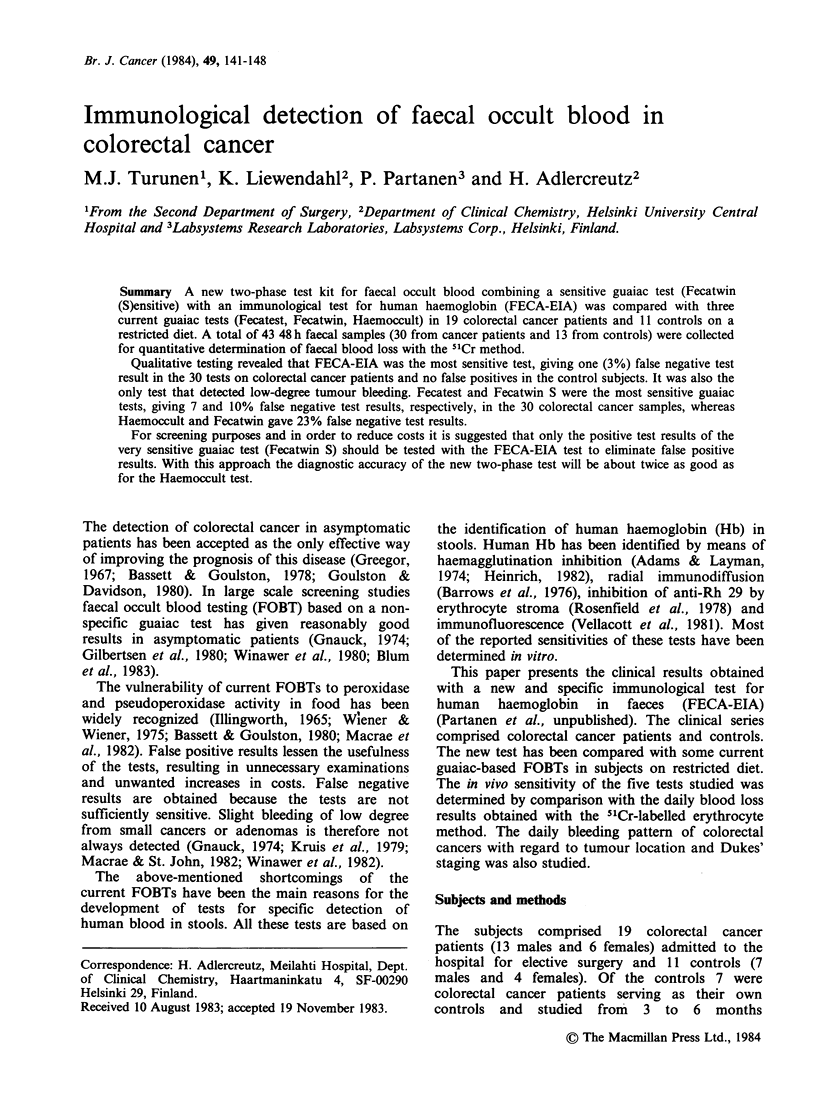
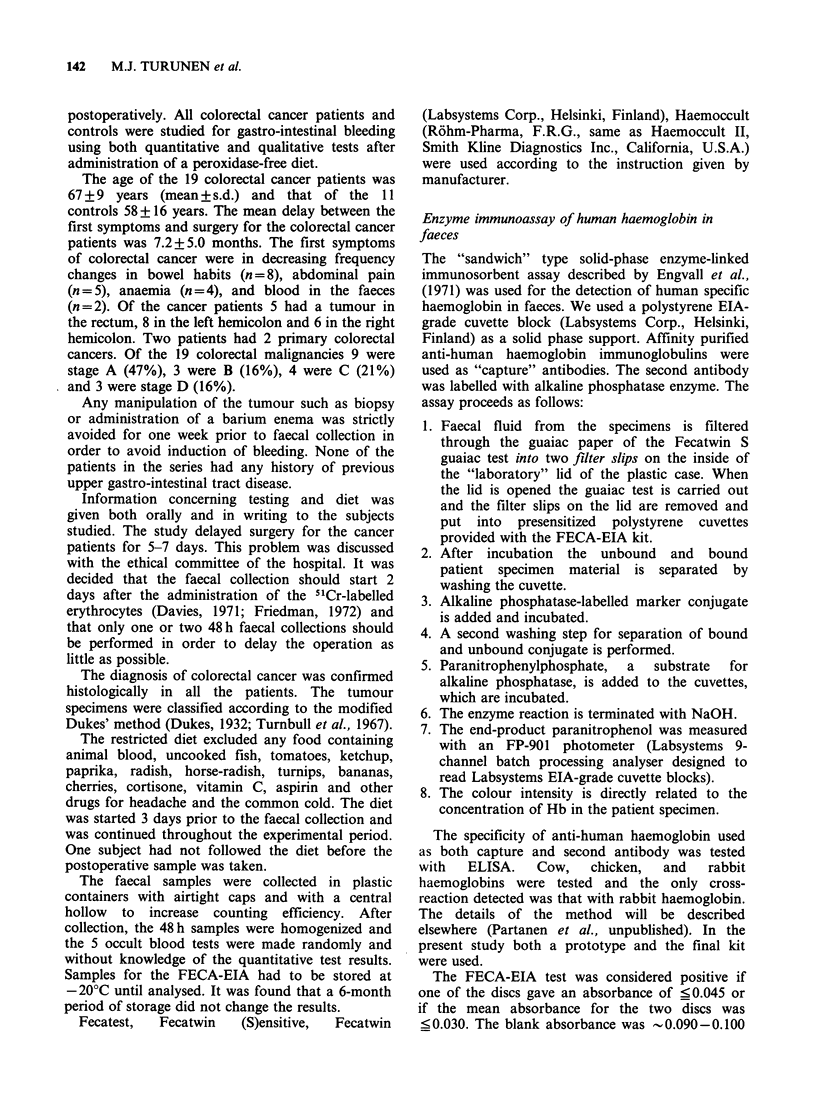
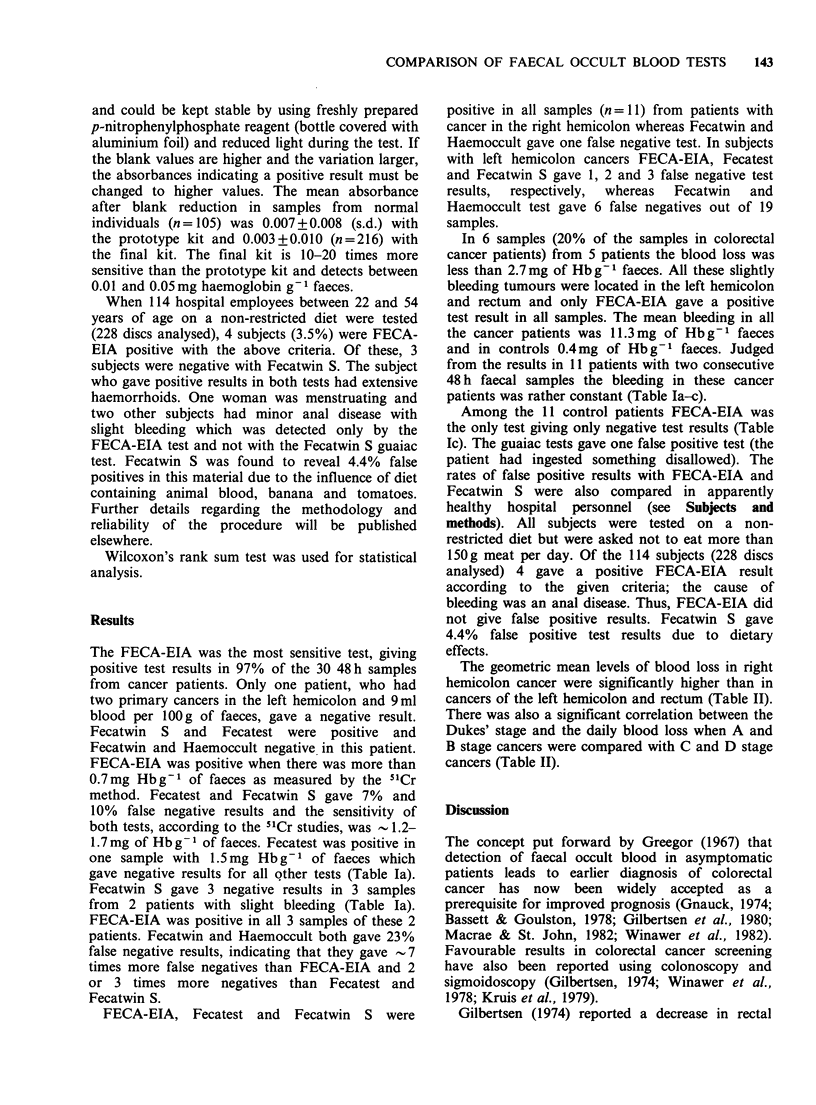
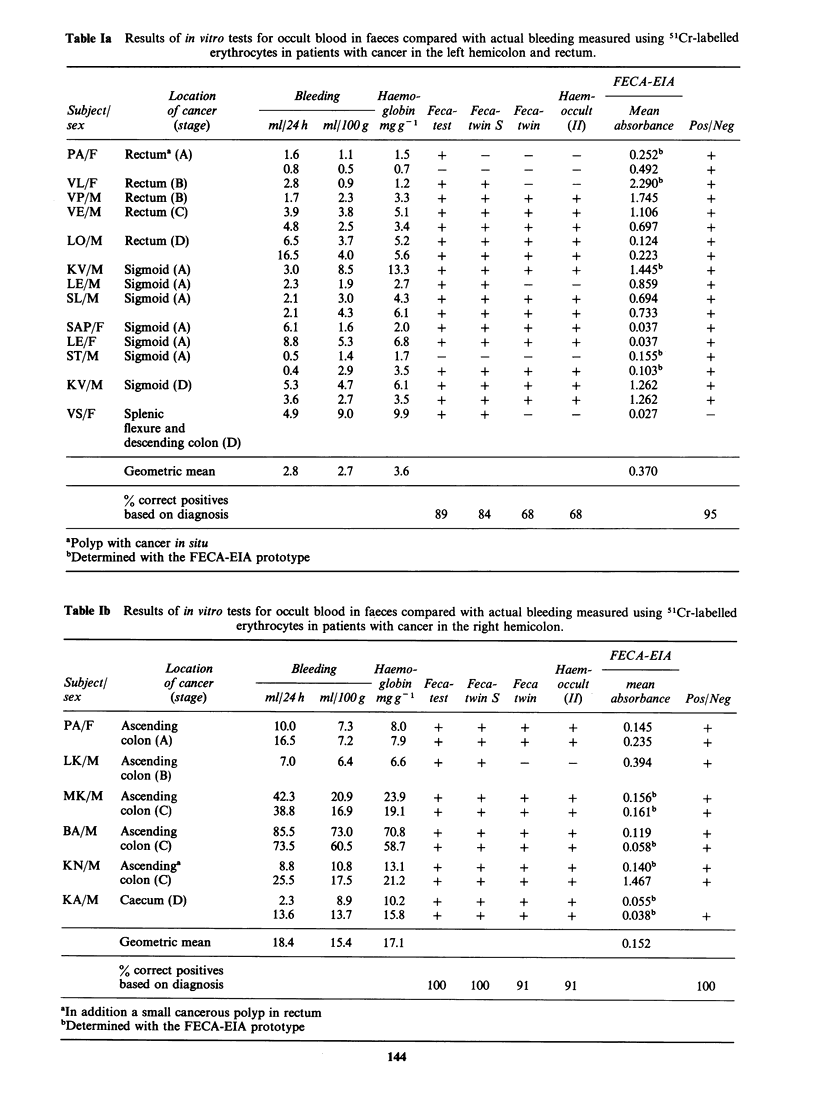
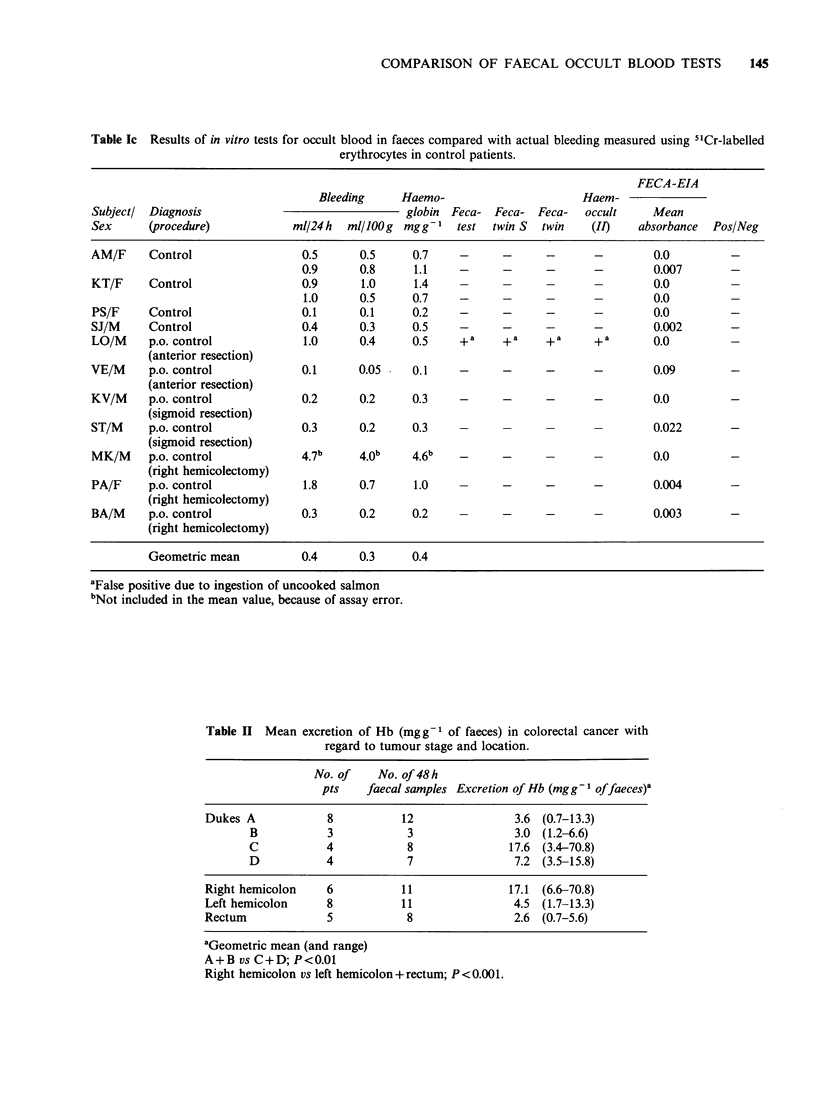
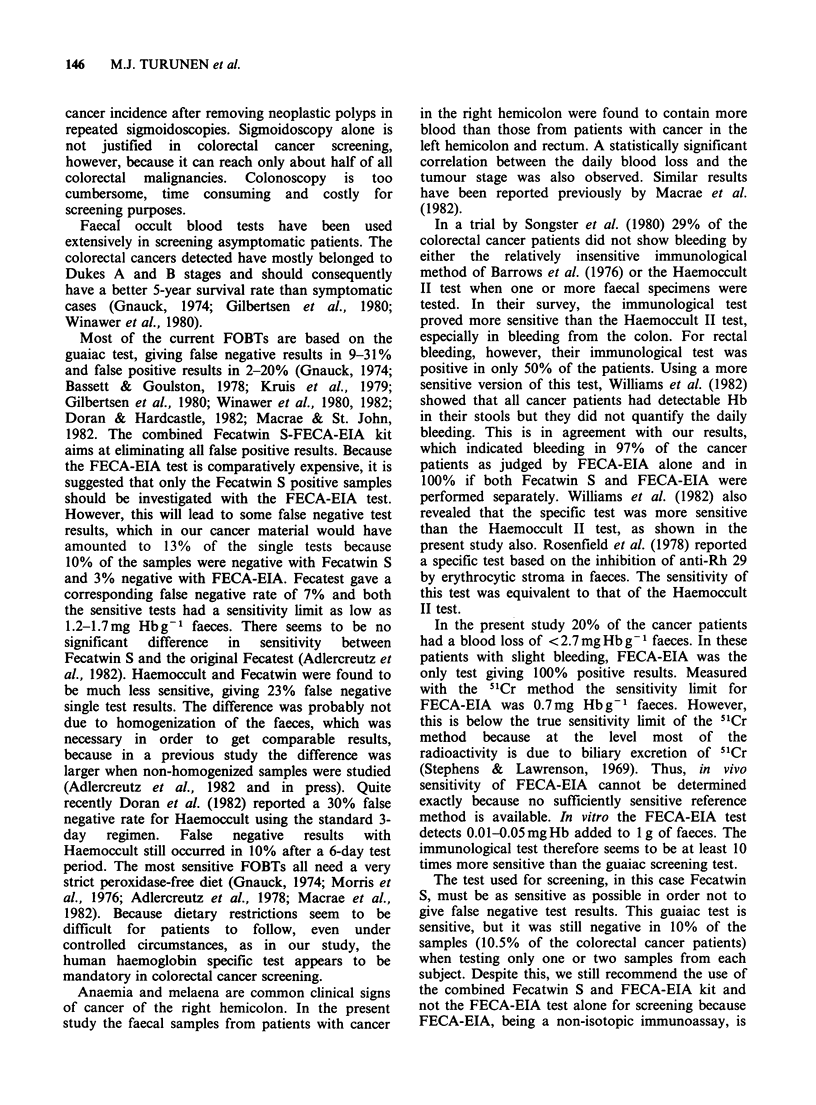
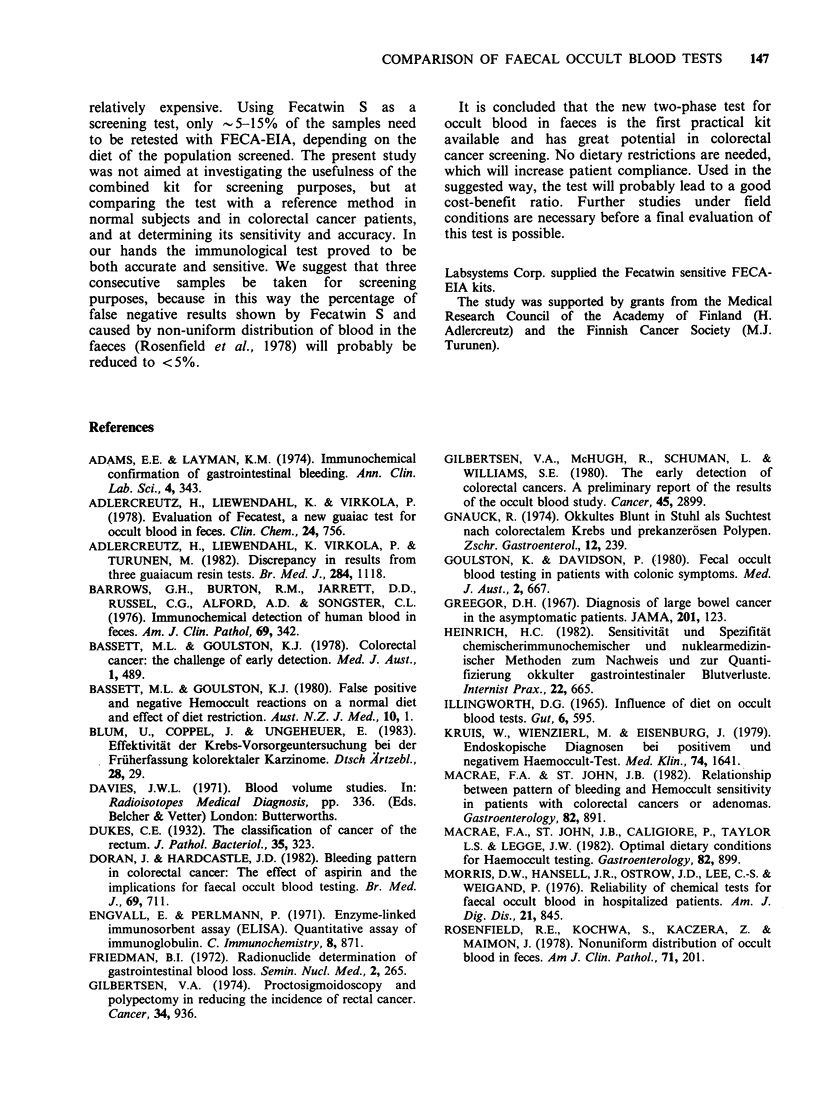
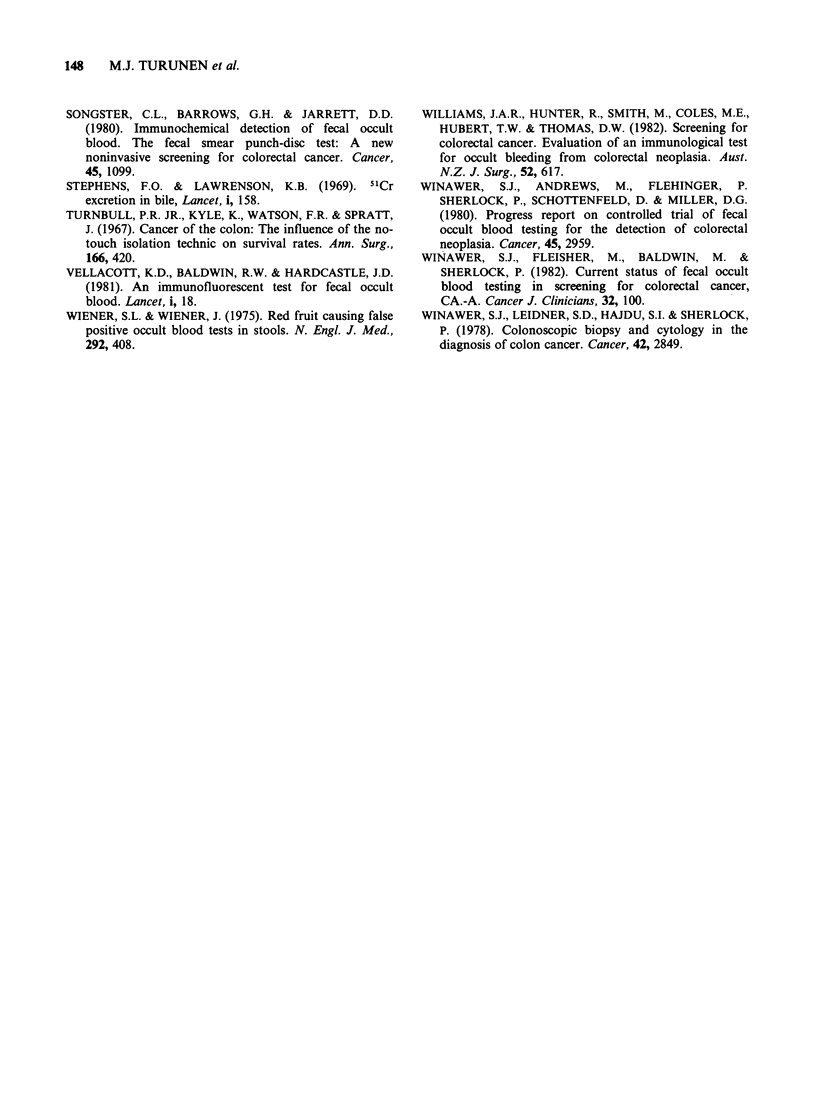
Selected References
These references are in PubMed. This may not be the complete list of references from this article.
- Adams E. C., Layman K. M. Immunochemical confirmation of gastrointestinal bleeding. Ann Clin Lab Sci. 1974 Sep-Oct;4(5):343–349. [PubMed] [Google Scholar]
- Adlercreutz H., Liewendahl K., Virkola P. Evaluation of Fecatest, a new guaiac test for occult blood in feces. Clin Chem. 1978 May;24(5):756–761. [PubMed] [Google Scholar]
- Adlercreutz H., Liewendahl K., Virkola P., Turunen M. J. Discrepancy in results from three guaiacum resin tests. Br Med J (Clin Res Ed) 1982 Apr 10;284(6322):1118–1118. doi: 10.1136/bmj.284.6322.1118. [DOI] [PMC free article] [PubMed] [Google Scholar]
- Barrows G. H., Burton R. M., Jarrett D. D., Russell G. G., Alford M. D., Songster C. L. Immunochemical detection of human blood in feces. Am J Clin Pathol. 1978 Mar;69(3):342–346. doi: 10.1093/ajcp/69.1.342. [DOI] [PubMed] [Google Scholar]
- Bassett M. L., Goulston K. J. Colorectal cancer: the challenge of early detection. Med J Aust. 1978 May 6;1(9):489–493. doi: 10.5694/j.1326-5377.1978.tb112571.x. [DOI] [PubMed] [Google Scholar]
- Bassett M. L., Goulston K. J. False positive and negative hemoccult reactions on a normal diet and effect of diet restriction. Aust N Z J Med. 1980 Feb;10(1):1–4. doi: 10.1111/j.1445-5994.1980.tb03408.x. [DOI] [PubMed] [Google Scholar]
- Doran J., Hardcastle J. D. Bleeding patterns in colorectal cancer: the effect of aspirin and the implications for faecal occult blood testing. Br J Surg. 1982 Dec;69(12):711–713. doi: 10.1002/bjs.1800691209. [DOI] [PubMed] [Google Scholar]
- Engvall E., Perlmann P. Enzyme-linked immunosorbent assay (ELISA). Quantitative assay of immunoglobulin G. Immunochemistry. 1971 Sep;8(9):871–874. doi: 10.1016/0019-2791(71)90454-x. [DOI] [PubMed] [Google Scholar]
- Friedman B. I. Radionuclide determination of gastrointestinal blood loss. Semin Nucl Med. 1972 Jul;2(3):265–269. doi: 10.1016/s0001-2998(72)80037-0. [DOI] [PubMed] [Google Scholar]
- Gilbertsen V. A., McHugh R., Schuman L., Williams S. E. The earlier detection of colorectal cancers: a preliminary report of the results of the Occult Blood Study. Cancer. 1980 Jun 1;45(11):2899–2901. doi: 10.1002/1097-0142(19800601)45:11<2899::aid-cncr2820451132>3.0.co;2-m. [DOI] [PubMed] [Google Scholar]
- Gilbertsen V. A. Proctosigmoidoscopy and polypectomy in reducing the incidence of rectal cancer. Cancer. 1974 Sep;34(3):suppl–suppl:939. doi: 10.1002/1097-0142(197409)34:3+<936::aid-cncr2820340722>3.0.co;2-5. [DOI] [PubMed] [Google Scholar]
- Gnauck R. Okkultes Blut im Stuhl als Suchtest nach kolorektalem Krebs und präkanzerösen Polypen. Eine Feldstudie bei 815 Erwachsenen. Z Gastroenterol. 1974 Jun;12(4):239–250. [PubMed] [Google Scholar]
- Goulston K., Davidson P. Faecal occult blood testing in patients with colonic symptoms. Med J Aust. 1980 Dec 13;2(12):667–668. doi: 10.5694/j.1326-5377.1980.tb131969.x. [DOI] [PubMed] [Google Scholar]
- Illingworth D. G. Influence of diet on occult blood tests. Gut. 1965 Dec;6(6):595–598. doi: 10.1136/gut.6.6.595. [DOI] [PMC free article] [PubMed] [Google Scholar]
- Kruis W., Weinzierl M., Eisenberg J. Endoskopische Diagnosen bei positivem und negativem Haemoccult-Test: Zur Frage der Indikation und Wertigkeit dieses Tests. Med Klin. 1979 Nov 2;74(44):1641–1644. [PubMed] [Google Scholar]
- Macrae F. A., St John D. J., Caligiore P., Taylor L. S., Legge J. W. Optimal dietary conditions for hemoccult testing. Gastroenterology. 1982 May;82(5 Pt 1):899–903. [PubMed] [Google Scholar]
- Macrae F. A., St John D. J. Relationship between patterns of bleeding and Hemoccult sensitivity in patients with colorectal cancers or adenomas. Gastroenterology. 1982 May;82(5 Pt 1):891–898. [PubMed] [Google Scholar]
- Morris D. W., Hansell J. R., Ostrow J. D., Lee C. S. Reliability of chemical tests for fecal occult blood in hospitalized patients. Am J Dig Dis. 1976 Oct;21(10):845–852. doi: 10.1007/BF01072075. [DOI] [PubMed] [Google Scholar]
- Songster C. L., Barrows G. H., Jarrett D. D. Immunochemical detection of fecal occult blood--the fecal smear punch-disc test: a new non-invasive screening test for colorectal cancer. Cancer. 1980 Mar 15;45(5 Suppl):1099–1102. doi: 10.1002/1097-0142(19800315)45:5+<1099::aid-cncr2820451312>3.0.co;2-t. [DOI] [PubMed] [Google Scholar]
- Stephens F. O., Lawrenson K. B. 51Cr Excretion in bile. Lancet. 1969 Jan 18;1(7586):158–159. doi: 10.1016/s0140-6736(69)91175-1. [DOI] [PubMed] [Google Scholar]
- Turnbull R. B., Jr, Kyle K., Watson F. R., Spratt J. Cancer of the colon: the influence of the no-touch isolation technic on survival rates. Ann Surg. 1967 Sep;166(3):420–427. doi: 10.1097/00000658-196709000-00010. [DOI] [PMC free article] [PubMed] [Google Scholar]
- Vellacott K. D., Baldwin R. W., Hardcastle J. D. An immunofluorescent test for faecal occult blood. Lancet. 1981 Jan 3;1(8210):18–19. doi: 10.1016/s0140-6736(81)90118-5. [DOI] [PubMed] [Google Scholar]
- Wiener S. L., Wiener J. Letter: Red fruits causing false-positive occult blood tests in stool. N Engl J Med. 1975 Aug 21;293(8):408–408. doi: 10.1056/nejm197508212930818. [DOI] [PubMed] [Google Scholar]
- Williams J. A., Hunter R., Smith M., Coles M. E., Hubert T. W., Thomas D. W. Evaluation of an immunological test for occult bleeding from colorectal neoplasia. Aust N Z J Surg. 1982 Dec;52(6):617–621. doi: 10.1111/j.1445-2197.1982.tb06128.x. [DOI] [PubMed] [Google Scholar]
- Winawer S. J., Andrews M., Flehinger B., Sherlock P., Schottenfeld D., Miller D. G. Progress report on controlled trial of fecal occult blood testing for the detection of colorectal neoplasia. Cancer. 1980 Jun 15;45(12):2959–2964. doi: 10.1002/1097-0142(19800615)45:12<2959::aid-cncr2820451212>3.0.co;2-e. [DOI] [PubMed] [Google Scholar]
- Winawer S. J., Fleisher M., Baldwin M., Sherlock P. Current status of fecal occult blood testing in screening for colorectal cancer. CA Cancer J Clin. 1982 Mar-Apr;32(2):100–112. doi: 10.3322/canjclin.32.2.100. [DOI] [PubMed] [Google Scholar]
- Winawer S. J., Leidner S. D., Hajdu S. I., Sherlock P. Colonoscopic biopsy and cytology in the diagnosis of colon cancer. Cancer. 1978 Dec;42(6):2849–2853. doi: 10.1002/1097-0142(197812)42:6<2849::aid-cncr2820420646>3.0.co;2-u. [DOI] [PubMed] [Google Scholar]


